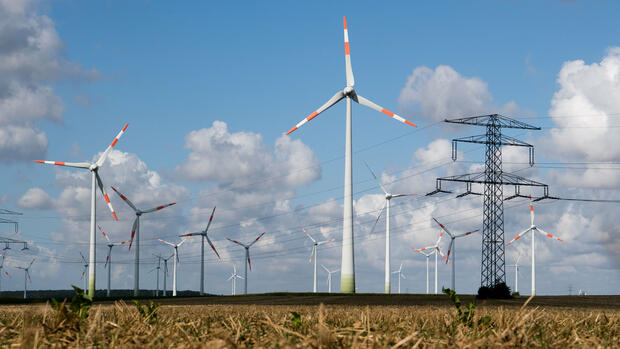Parts of northern Germany produce more electricity than they consume themselves.
(Photo: dpa)
Berlin The availability of green electricity is a decisive location factor for companies. The north of Germany, with enormous amounts of electricity from wind power, performs significantly better than the south. This is confirmed by a survey of 924 companies, compiled by the employer-friendly IW Cologne, the think tank Epico and the Climate Economy Foundation. The survey results are part of the study “Locational Advantage Renewable Energies”, which is available to the Handelsblatt.
According to the survey, almost 80 percent of the companies rate the prospects for a climate-neutral energy supply in northern Germany as “rather good” or “very good”. In contrast, only 30 percent of the companies said this about the southern federal states.
>> Read also: bp and Total pay billions for German offshore wind farms at the auction
The study therefore sees a clear need for action in southern Germany and states that where renewable energies are not available, the competitiveness of the location is at risk. In the south, there was a lack of wind turbines and connections to new and existing lines for electricity and hydrogen, write the authors of the study.
In particular, the energy-intensive industry in southern Germany has a high demand for renewable electricity in order to achieve a successful transformation towards climate neutrality. The demand cannot be covered by solar energy capacities alone. “The south is therefore dependent on the ambitious construction of further wind turbines on land, which has so far been implemented far too slowly. Against the background of the sluggish expansion of the transmission grid and the higher capacity of wind turbines, the north has a clear locational advantage,” write the authors.
Wind turbines are particularly lacking in Bavaria
In order to lower electricity prices and strengthen security of supply, more consistent expansion is necessary in all regions of Germany. In recent years, the expansion in the south has often failed due to excessive distance regulations and the resulting lack of space, lengthy permits and inconsistent standards for species protection requirements.
Bavaria has so far had large solar capacities, but the expansion of wind power is faltering.
(Photo: IMAGO/Action Pictures)
In fact, the south of Germany, especially Bavaria, shows deficits in the expansion of renewables. In the north, on the other hand, the expansion of wind power is particularly well advanced. Some northern German federal states generate more electricity from renewable sources in their area than is consumed in the respective state itself.
The high proportion of renewables in power generation is also considered a decisive factor for industrial settlements in the recent past. The construction of the Tesla factory in Grünheide, Brandenburg, is repeatedly cited as an example. The study states that the extent to which a business model is tied to previous locations plays an important role. For example, the lack of an adequate supply of green energy “can cause the failure of climate-neutral operations on site or provide incentives to relocate”.
Bavaria has struggled with the expansion of wind power over the years. Although photovoltaics are widespread there, as is electricity from hydropower and biomass, the expansion of wind power is faltering. The situation is made more difficult by the fact that the electricity transport from north to south is far from functioning smoothly due to the backlog in grid expansion. Bavaria and Baden-Württemberg can therefore only benefit to a limited extent from the electricity surpluses in the north.
The EU Commission has also been dealing with the issue for a long time, which has repeatedly called for the establishment of at least two electricity bidding zones in Germany. So far there has been a uniform German electricity bidding zone. Power bidding zones are the geographic areas within which market participants can trade power. The larger a bidding zone, the further electricity has to be transported before it can be used, which involves significant costs.
If Germany were to be divided into two bidding zones, electricity would be cheaper in the northern zone than in the southern because there is a surplus in the north and a shortage in the south. This could create an incentive for industrial settlements in the north.
In addition to the faster expansion of renewable energies, the authors’ recommendations for action include the establishment of broad-based import relationships for climate-neutral hydrogen. In addition, better opportunities must also be created for smaller companies to purchase climate-neutral electricity directly by contract.
More: Transport, heat, industry – the federal government wants to use hydrogen in all areas
